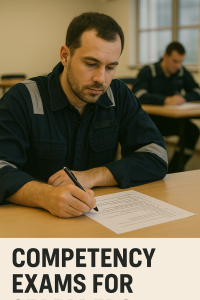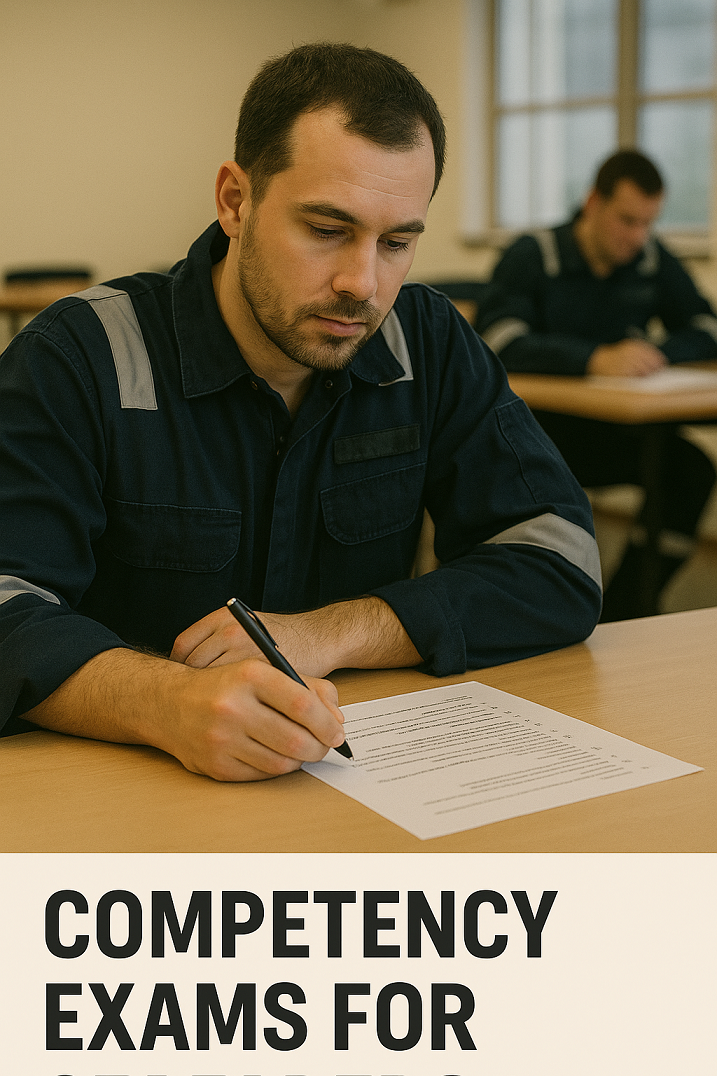 Explore the top 12 reasons why competency exams for seafarers are more stressful than ever. From new STCW updates to rising digital expectations, this guide unveils the growing challenges and how to prepare effectively.
Explore the top 12 reasons why competency exams for seafarers are more stressful than ever. From new STCW updates to rising digital expectations, this guide unveils the growing challenges and how to prepare effectively.
The salty air, the hum of the engine room, the rhythm of waves—these are the parts of maritime life seafarers embrace. But long before they can stand confidently on a ship’s bridge or engine control room, they must conquer a rite of passage that has grown more stressful over time: the seafarer competency exam.
Competency exams under the International Convention on Standards of Training, Certification and Watchkeeping for Seafarers (STCW) are critical for ensuring that maritime professionals meet international safety and operational standards. But as global maritime regulations evolve and expectations rise, so too does the anxiety surrounding these assessments.
Why Seafarer Competency Exams Matter
Competency exams are not just a formality. They are a gateway to professional responsibility at sea. Whether aiming for a Certificate of Competency (CoC) as a deck officer, marine engineer, or electro-technical officer, these exams determine a mariner’s ability to operate safely, follow international regulations, and protect human lives and the environment.
STCW-compliant certificates are recognized globally and are mandated by the International Maritime Organization (IMO), flag states, and port state control authorities (e.g., AMSA, MCA, Transport Canada). Any lapse in training, certification, or examination can affect employment, vessel operation, and insurance compliance.
1. Constant Updates to STCW Requirements
The IMO’s STCW Convention is dynamic. With amendments such as the Manila Amendments (2010) and proposed updates addressing automation and cybersecurity, mariners must constantly adapt.
For example, recent IMO discussions in the HTW Sub-Committee propose mandatory training in electronic navigation systems, cybersecurity protocols, and ECDIS updates. This adds more topics to already dense syllabi.
As one Indian second officer put it, “You study something in college, but by the time you appear for the exam, there’s already a new guideline.”
2. More Complex and Technical Content
Competency exams now include:
- ECDIS operations and troubleshooting
- High Voltage (HV) systems
- Environmental management under MARPOL
- Polar Code knowledge for navigation in Arctic routes
This shift toward higher complexity reflects the changing nature of ships and operations but creates immense pressure, especially for candidates without onboard experience in these areas.
3. Transition to Digital/Computer-Based Exams
Many maritime administrations now use computer-based testing (CBT). While this improves consistency and access, it introduces new stressors:
- Unfamiliarity with digital interfaces
- Technical glitches during exams
- Limited feedback on performance
According to the Maritime and Coastguard Agency (MCA), CBT reduces examiner bias but increases candidate anxiety, especially among older seafarers or those with limited digital literacy.
4. Language Barriers and Global English Expectations
English is the official language of maritime communication. But many seafarers come from non-English-speaking countries, such as the Philippines, India, Indonesia, Ukraine, and Russia.
Candidates often face:
- Difficulty interpreting technical questions
- Misunderstanding oral examiners with different accents
- Struggles with maritime English, especially in oral scenarios
This language pressure contributes to exam-day panic, despite the candidate’s technical knowledge.
5. Shortage of Real Sea-Time Experience Before Exams
Due to COVID-19 disruptions and increased cadet intake, many seafarers complete training without sufficient onboard exposure. This affects their ability to:
- Visualize machinery or bridge layouts
- Apply theoretical knowledge practically
- Describe operations clearly in orals
The International Chamber of Shipping (ICS) raised concerns in its 2023 report about cadets getting CoCs without robust shipboard grounding.
6. Fear of Oral Examinations and Examiner Variability
Oral exams remain the most nerve-wracking part of the process. Unlike written tests, they:
- Are highly subjective
- Depend on the mood, style, and expectations of the examiner
- May involve rapid-fire questioning under pressure
One Filipino cadet described his oral exam as “less about what you know and more about how confidently you say it.”
7. Economic Pressure and Employment Competition
Failing a competency exam has real-world financial consequences. For many, a delay in certification means:
- Postponed joining dates
- Missed salary opportunities
- Rising debt due to training costs
With growing competition in the global maritime workforce (especially from countries like Myanmar, Georgia, and Bangladesh), the stakes are incredibly high.
8. Overloaded Maritime Academies and Limited Faculty Support
Some maritime training institutes are underfunded or overcrowded. As a result:
- Cadets don’t receive personal mentorship
- Labs are outdated
- Simulation time is restricted
Despite the STCW requiring specific practical exposure (as per IMO Model Courses), many institutions fall short. This leaves cadets poorly prepared for exam scenarios involving advanced systems or modern regulations.
9. Greater Focus on Environmental Compliance and IMO 2020/2050 Goals
Today’s seafarers are being tested not just on traditional navigation or engine systems, but on:
- Emissions control
- Ballast water management
- Carbon Intensity Indicator (CII) and EEXI
- Energy Efficiency Operational Index (EEOI)
These topics are evolving faster than textbook updates, and many cadets struggle to access updated material unless their institution is well-connected with IMO resources.
10. Mental Health and Burnout from Long Study Hours
Maritime training is intense. Seafarers study full-time, often while completing simulator sessions or onboard training. Combined with family pressure, isolation from peer support, and the high cost of reattempts, stress levels skyrocket.
The International Transport Workers’ Federation (ITF) and International Maritime Health Association (IMHA) report rising anxiety and sleep disorders among maritime students, particularly around exam periods.
11. Increasing Reliance on Memorization Over Understanding
In some regions, students are trained to memorize question banks and expected answers rather than understand underlying principles. This may help pass written exams but creates panic during oral tests or practical questions.
A chief engineer from Ghana noted, “When asked why a purifier vibrates excessively, some candidates could recite machinery parts but not explain why vibration increases with sludge buildup.”
12. Regulatory Differences Between Flag States
Each flag state interprets STCW slightly differently. For example:
- The UK MCA focuses heavily on oral defense of actions
- Panama issues written-only exams
- India combines orals with written technical subjects
Candidates applying for CoCs under different jurisdictions face confusion over what to expect, adding to stress.
Case Study: A Cadet’s Struggle with Oral Exams in the UK
Ahmed, a Nigerian cadet, trained under a local STCW-approved program and applied for his OOW license from the UK MCA. Despite scoring well in written tests, he failed the oral exam twice.
His feedback? “They asked how I would handle a blackout during UMS operations. I froze. We never did UMS on our training ship.”
Ahmed eventually passed, but only after undergoing mock orals with a senior officer, improving his confidence and practical articulation.
FAQ: Competency Exams for Seafarers
What is a CoC and why is it important?
A Certificate of Competency (CoC) proves that a seafarer is qualified to perform specific duties onboard, in compliance with STCW standards. It is essential for legal and operational roles at sea.
How often do STCW regulations change?
While major updates are infrequent (e.g., Manila Amendments), minor revisions and guidance circulars are released frequently by the IMO and national authorities.
What happens if you fail a competency exam?
You must reapply, usually after a mandatory waiting period. Multiple failures can delay your career progress significantly.
Are online study tools helpful for seafarer exams?
Yes, platforms like Marine Insight, Lloyd’s Maritime Academy, and IMO e-learning offer valuable content, but they should supplement—not replace—practical training.
Is the oral exam the hardest part?
For most seafarers, yes. It requires confident communication, situational understanding, and calmness under pressure.
Conclusion: Building Confidence Amid Complexity
There’s no denying that competency exams for seafarers have become more stressful than ever. As the maritime world becomes more digital, regulated, and environmentally conscious, the bar for professional certification continues to rise.
But stress doesn’t have to equal failure. With the right support, training, mentorship, and resources, today’s cadets can rise to meet tomorrow’s standards. Maritime administrations, training centers, and seafarers themselves must work together to make competency not just a test—but a journey of professional growth.
References
- International Maritime Organization. (2023). Standards of Training, Certification and Watchkeeping (STCW). https://www.imo.org
- Maritime and Coastguard Agency (UK). (2022). MCA Oral Exam Guidelines. https://www.gov.uk
- ICS. (2023). Seafarer Training and Certification Review. https://www.ics-shipping.org
- ITF Seafarers. (2022). Mental Health in Maritime Careers. https://www.itfseafarers.org
- Marine Insight. (2023). Guide to STCW Exams and Model Questions. https://www.marineinsight.com
- BIMCO. (2023). Competence Standards for Maritime Professionals. https://www.bimco.org
- Lloyd’s Maritime Academy. (2023). Online Learning for Marine Professionals. https://www.lloydsmaritimeacademy.com
- IMAREST. (2022). Navigating Modern Competency Requirements. https://www.imarest.org
- IMO HTW Sub-Committee Reports. (2023). Human Element, Training and Watchkeeping. https://www.imo.org

